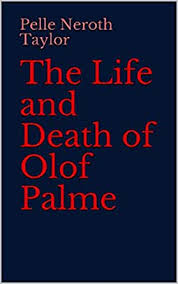The Life and Death of Olof Palme: A Biography (2015) by Pelle Neroth.
GoodReads meta-data is 181 pages (it seemed like a lot more), rated 3.30 by ten litizens.
Genre: Biography (ostensibly).
Verdict: Bah!
Olof Palme (1927-1986) was bigger than life, or so it seemed at times. He was here; he was there; he was everywhere promoting this cause and that. It seemed to me that his talkfests were in fact productive in the long run, and that is why I wanted to read about him. What motivated him to start the marathons and what kept him running? I am still wondering after reading this, the second book I have been through about him.
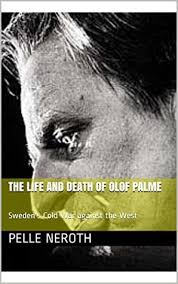
While there is some information about Palme’s background as a child of privilege, as an army officer, as a Labor party apparatchik, as a minister, and prime minister, there is very little about the man inside. If there are letters he wrote to friends, personal acquaintances who knew him, insightful associates, they are absent from these pages which increasingly became a chronicle of his public life taken from his official calendar, punctuated by rambling asides about the Cold War, environmentalism, Swedish class structure, or sonar technology as the context, and then – inevitably – the assassination where the Bermuda Triangle of speculations continue unencumbered with either rhyme or reason in a cocktail of stupidity, credulity, and worse. Idiocy is not confined to MAGAites.
Some obvious points are elided. Swedish prosperity from 1945 was founded on neutrality in World War II which meant it did not have to rebuild after the war, unlike most of the rest of Europe, and also its role in administering the millions of the Marshall Plan. This prosperity paid for much that followed until the rest of the Europe caught up. By the way, Count Bernadotte whom Napoleon put on the Swedish throne established Swedish neutrality in the early 19th Century. Until then Sweden had long been a major aggressor in northern Europe.
The claim is made in this book that Sweden began to lag in science and technology because Palme governments had other priorities. The evidence for this slide is the decrease in the number of Nobel Prizes going to Swedes. ‘Oh dear, is there not an obvious explanation?’ The process of Nobel Prize selection has become less parochial and more systematic, international, and transparent and that led to a wider distribution of prizes than Swedes awarding Swedes. See Burton Feldman, The Nobel Prize (2001), discussed elsewhere on this blog. To wit, there was a time when I had the word ‘Dean’ in my title, when I got a letter from Stockholm every year inviting me to nominate someone for the Nobel Prize in Economics. The net was cast very widely.
On the subject of Nobel Prizes my question is why Palme did not get a Peace Prize for endless good works in the Middle East and Africa? When I think of some Peace Prize winners, well, not naming any names, ahem, but Palme was far more significant than some named Al or that one-term senator from Illinois.
What with all the rather confused asides I never had a feeling for whom his constituents were, or even how many elections and votes the Social Democratic party won with him leading it. Nor is there any effort to show him on the campaign trail. Did he meet-and-greet? Remember names? Did his speeches register with auditors? Was his electoral appeal generational? Gendered? Could he laugh at himself?
I did learn a few things. The Sweden Palme was born into was a conservative, religious, rigid society with sharp class distinctions underscored by the use of language in ways unfathomable to me. Think of the sclerotic Ingmar Bergman movies of the 1950s. Palme was born to the haute mercantile class and related to other members of the second-tier elite, like Max von Sydow and Raul Wallenberg. His paternal grandmother was a Baroness who spoke German. The first tier, by the way, were those with inherited wealth from the residual aristocracy. There were many more tiers in a finely calibrated social structure that had the rigidity of an Indian caste system.
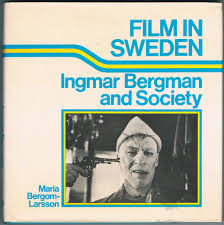
He grew up in a multi-lingual environment, and spoke freely in German, Swedish, and English. But he was often cryptic, perhaps impatient, and that led to many misunderstandings. An example is his often quoted remark that his experiences in the United States as an exchange student for one year at Kenyon College in Ohio made him into a socialist. Most of the references to this remark have it that he was repelled by the poverty and racism he saw (and he was) on his many Greyhound bus travels before and after school, but in fact he meant that he was inspired by the can-do attitude he found into thinking great things could be accomplished by energy and perseverance in a rich society.
When his father died young, Olof had been sent to a boarding school (like Eton), where as a sickly weakling he was bullied but found the schoolwork easy. It is also said he failed to wash himself and continued that habit for years. My inference is that this ninety-pound weakling avoided the communal showers where he would have been tormented, but the author draws no such conclusion. The author peers down the psychology lens and supposes that much of Palme’s later reforming zeal was payback to the elite for these experiences, reducing the political to the personal. That elite would have included most of his friends and family.
He had a budding career as an army officer where he proved adept at intelligence work and kept a cool head under pressure. While still a reserve officer in the army he was the president of the Swedish National Union of (university) Students, an unpaid position, where he proved to be an adept organiser and motivating force. He concentrated on international cooperation especially with the emerging nations of the post-colonial world. How he could afford to work full time for nothing is not explained.
He came to the notice of the incumbent Social Democrat prime minister, Tage Erlander, who in 1953 hired him as an executive assistant, because his party needed a broader international outlook in the post-war world and more engagement with youth. This selection of an outsider irked many entrenched interests with the SD tent.
Erlander became a father figure for Palme who was his number one protégé. The Social Democratic party at the time was dominated by trade unionists and their aspiration was a comfortable living for their members in the existing social order. These were sewer socialists with no program of social change such as Palme later envisioned.
Palme resigned from the army and very much against the wishes of his family went into politics, winning election to parliament in 1957. His first major assignment in politics was to mastermind the switch from left-hand to right-hand driving in Sweden to align it with Norway, Finland, and Denmark with which it had land borders. That must have been an enormous challenge, but it is barely mentioned in these pages. Yet it would have brought him into contact with a broad cross section of the society, and given him a network for the future.
He married Lisbet from a similar social background who influenced him greatly with her work in child psychology, first as minister of education and then minister of communication, under her influence, he made children a priority. Opponents saw this as indoctrinating youth. Take that Sesame Street! (She was omitted from the Palme biography on Wikipedia when I looked. Figure that out.)
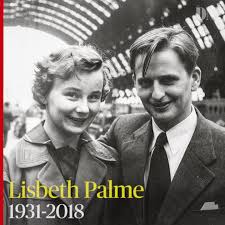
In the 18th Century warrior King Charles XII had made church attendance compulsory and put pastors on the government payroll, making them agents of the state. They visited homes twice a year for inspections, reporting findings up the line. The pastors were to make sure everything was done the right way at home. this intrusion became a state function in the 1930s with home visits by officials. (This Swedish practice is parodied in Kitchen Stories [2003], a Norwegian film.) The pressure for conformity backed by the fear of damnation explains much of the oppressive weight in Bergman films.
(Charles wanted healthy boys, and lots of them, for the endless wars he waged in Poland, Denmark, Russia, Ukraine, Moravia, Saxony, Lithuania, Crimea, and more. In the end he depopulated Sweden of men, that story is mentioned in my review of a biography of this dynamic but destructive king elsewhere on the blog.)
This preoccupation with national health and fitness followed the science in the late 1920s down the path of eugenics and then euthanasia, which continued far too long. Yes, the sanctified Social Democratic government of Sweden practiced forced sterilisation for generations. And dare it be said, murder of the unfit. It was Prime Minister Palme who put a stop to such practices. See New Mankind (2007), a Finnish movie about these activities in Sweden. It seems Sweden’s closest neighbours are least blinded by its halo, and its most severe critics.
‘Sanctified,’ I wrote above. The Anglo-American hagiography of Sweden was founded by Marquis Childs, a significant journalist of his time, with three books that set the mould for much of the perception of Sweden for the next several generations: Sweden: Where Capitalism is Controlled (1934), Sweden: The Middle Way (1936), and This is Democracy (1938). These texts became the old testament gospel of Sweden which has continued to this day. Reformer, idealists, dreamers, many of them thought Sweden was the pot of utopian gold at the end of rainbow. Pilgrimages to Stockholm to see this land of dreams has remained a coming of age ritual for many English-speaking intellectuals. Even in Australia of the 1980s this cult of Sweden was strong with Laurie Carmichael’s government sponsored report Australia Reconstructed (1987) based on the mirage of Sweden. Dig up a copy for amusing reading today. Hint the State Library lists in the online catalogue but the University of Sydney Library does not, despite the pontifications about it by members of that university.
Australia was not the only place where this sanctification occurred. Stateside, I once gave a conference paper on the superficial stupidity of worshipping the Swedish model as utopia, pulling my punches as usual, to a glacial reception of PhDs who visibly cringed at hearing criticisms of Swetopia. (Just coined that term – Swetopia.) It was a struggle to get that paper published, though persistence finally paid off, but I also remember well some of the inane comments of anonymous referees defending Swetopia, but I failed to keep the copies when I vacated my office in 2010.Tant pis!
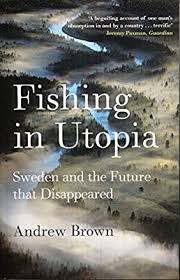
Andrew Brown’s Fishing in Utopia (2007) remains the best book I have read on Sweden because it is about his life day by day. Its most memorable take-away is that Swedes work hard and do so because no one owes them a living either as individuals or as a country. I was tempted to add a layer of Protestant Ethic to his explanation. He contrasted that to the England he had left, where work was to be avoided at all costs. This simple but fundamental insight is not to be found in the Swetopia hagiography like Australia Reconstructed (1987).
Count Bernadotte whom Napoleon put on the Swedish throne to get him out of the way, founded the Swedish foreign policy of neutrality as the best way to survive great politics and war.
Went I first visited Stockholm I made a pilgrimage to the site of Palme’s murder. (Saw a man urinating on the street mid-morning on the way, something I never saw in Italy.) On SBS a few years ago I saw a Swedish four-part series on the investigation into the Palme murder which I thought then was excellent: The Death of a Pilgrim (2013). Must have another look now that I know more of the time and place.

I had hoped to learn something of Palme’s biography from reading the book about his murder, but not so. Ergo I went back to this title, though I found the sample tabloid, but it is all there is. Fears confirmed.

